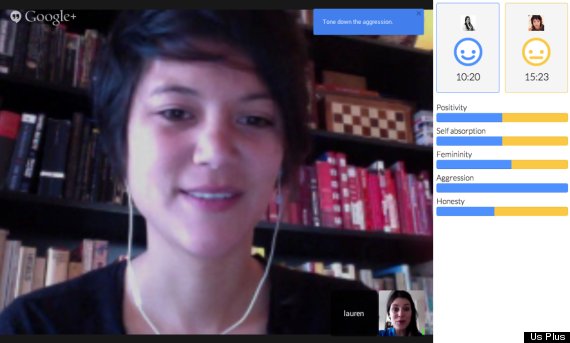
While technology has given us more ways to talk to each other, it hasn’t made us any better at it: We still rant, ramble, whine and generally irritate each other.
So what would happen if we let software try to fix our sub-par conversation skills?
That’s the question artists Lauren McCarthy and Kyle McDonald hope to answer with Us+, a new art project and application that aims to make humans more personable by giving us feedback from -- of all things -- an unfeeling algorithm.
Us+, which launched Monday, monitors your Google+ video chats and interrupts with criticism when it detects you blathering or being a "downer." It's free, and although it's social commentary, not a genuine startup, Us+ actually works
The app points to a future that is more certain than sci-fi: computers that program humans' personalities. Machines were once little more than automatons that did our bidding, but lately, the explosion of data, sensors and artificial intelligence is reversing those roles. Us+ joins a growing roster of actual techo-perfectionist apps, like Google Now, Lift, Refresh and Days of Our Lives, that count on algorithms to save us from ourselves. Technology, these apps' creators believe, can "disrupt" the oldest human vices, from awkward silences to whining.
McCarthy thinks there's a possibility some people find Us+ really does improve communication. But she also wants us to ask if that's such a good idea. The app is part social experiment, part critique of our readiness to be bossed around by machines -- even when it comes to something as intimate as reading emotion.

I tried Us+ with McCarthy, and, while we chat, I find myself looking to the app to tell me what I'm feeling. It's no relief to hear McCarthy was surprised by how quickly Us+ submitted to the app's commands.
"It reveals how willing we are for technology to help us and how willing we are to go along with it," McCarthy says. "If we find this useful and fun, what else do we find useful and fun? And at what point do we have no more agency at all?”
As McCarthy and I speak, Us+ tracks our facial expressions, how long we each talk and the emotional tone of our speech across five characteristics, including “femininity” and “self-absorption.” (Speech-to-text software transcribes the speakers' words, then calculates "self-absorption" or "aggression" by assigning the words to categories based on their meanings. If I use “positive emotion” words like “best,” “definitely” and “truly,” my positivity score will rise.) Research by psychologists at the University of Texas, Austin has shown that synchronizing verbal and nonverbal behavior, also known as “linguistic style matching," makes speakers feel closer and more connected. So if Us+ detects the tenor of a conversation tilting off-balance -- one person cheery, the other depressed -- the app will offer real-time feedback meant to bring everyone together. Us+ will even mute a person's microphone if she hogs the conversation for more than a minute.
That makes it tough to do an interview, I tell McCarthy.
"Try to look on the bright side," Us+ prompts, before she can reply.

Us+'s mock-demo, which could easily pass for one of Google's own promotional videos, promises the app will help you “get more out of your conversations." But "more" clearly means more convenience, posturing and manipulation than depth. In one clip, the auto-mute kicks in just as a teary girlfriend complains to her boyfriend that they’re “barely communicating.” And when Us+ tells him his girlfriend is “looking sad,” he blurts out “I love you." It seems he’s talking to the app as much as to the woman.
Like so many self-improvement apps, Us+ currently espouses the seemingly irreproachable goal of helping everyone get along. Yet it's easy to imagine the app, or one like it, being altered to manipulate speakers' behavior for more selfish ends.
In fact, this has already happened: McCarthy says she hacked the app while video-chatting with her boyfriend so that, unbeknownst to him, she could control the feedback he received. She rejiggered Us+ to show him more prompts like, “You should sound more positive” or “You should make Lauren smile more.”
“I just made him be really nice to me,” she explains.
I laugh out loud -- but abruptly stop when an Us+ tells me to “tone it down a bit. Lauren does not sound so happy.”
Given our willingness to take directions from a computer, McCarthy worries about what “normal” behavior a service like Us+ could be programmed to encourage.
"With a big company like Google building products, there's a lot of room for them to determine what's the optimal social behavior they're trying to achieve. And then they have the audience and tools to really make that happen," she notes.
Instead of trying to harmonize feelings, corporations could create an app that encourages subordinates to act more deferential to their superiors. The algorithms could be made gender-specific, so women would be urged to act more positive or feminine, and men pushed to be more aggressive. As I catch myself consulting Us+ to see if it approves of my tone, it becomes clear how easily we might fake our feelings to please the software, or say something because a computer told us to -- not because we meant it. Us+'s design makes conversations feel like a video game, where victory is winning friends and influencing people.
I voice some of these reservations to McCarthy.
The prompt “try to be more positive” flashes at the top of my screen.
